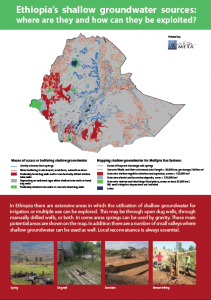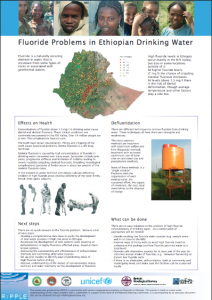Projects
Source to tap and back (S2TAB)
Project location: Upper Awash Basin (Addis Ababa, Oromia Regional State)
Sub-sector: Improved access to safe drinking water and sanitation, Improved river basin management and safe deltas
Applicant: Vitens Evides International BV
Partners: Adama Town Water Supply and Sewerage Service Enterprise; Addis Ababa Water and Sewerage Authority; Ethiopian Public Health Institute; MetaMeta; Oromiya Water, Mineral and Energy Bureau; Rijksinstituut voor Volksgezondheid en Milieu; Waterschap Vallei & Veluwe; Waterschap Zuiderzeeland
Project objectives
- Improving water and sanitation services in Addis Ababa and Adama, two of the largest cities in Ethiopia
- Having safe and reliable access to water as well as improvement of the sanitation services will reduce the occurrence of waterborne diseases.
- Contributing to the government’s effort towards sustainable economic growth and poverty alleviation.
- Enhancing self reliance of water and sanitation service providers.
Summary project intervention
Integrated water resource protection
- Establishment of a framework for integrated water resource protection and water quality monitoring using a stakeholder approach;
- Improve control of waste water discharges focussing on the Upper Awash and Akaki Rivers.
Drinkwater reservoir protection
- 50% reduction of sedimentation in catchment reservoirs around Addis Ababa;
- Improved sanitation for 25,000 people in buffer zones around these reservoirs of Addis Ababa.
Improved water services with AAWSA, Addis Ababa and AWSSE, Adama
- Water Safety Plans and Performance Improvement Plans implemented within AAWSA and AWSSE;
- Reduction and Management of Non Revenue Water (see box below) in order to improve
Water Supply and Increase Water Safety in Addis Ababa;
- Access to safe water for 25,000 people in Adama;
- Implementation of emergency programme for improved supply of water in Adama.
National Joint Capacity Education and Information Centre
- Building and establishment of the Joint Capacity Education and Information Centre;
- Capacity building for trainers and training material.
Sustainable Water Services in Harar Regional State (SWSH)
Project location: Harar Regional State
Sub-sector: Improved access to safe drinking water and sanitation
Applicant: Vitens Evides International BV
Partners: HEINEKEN Brewery SC, Harari People Regional State (HPRS), Harar Town Water Supply and Sewerage Service Authority (HWSA), Ethiopian Catholic Church-Social and Development Coordinating Office of Harar, MS Consultants, Acacia Water, DHV BV
Project objectives
The proposed PPP aims to ensure long term water availability for urban, rural and industrial consumers in Harar State currently facing urgent water shortages, affecting over 300.000 people.
Summary project intervention
This project will lead to improved water access and availability in Harar Regional State, Ethiopia, that suffers from heavy water shortages. In 2004, Harar’s main water source, Lake Haramaya has dried up, due to unsustainable exploitation practices. Water users, including consumers and industry in Harar, are faced with water scarcity. Competition for the available water is high and increasing. This is amplified by lack of expertise of key water actors (HPRS and HWSA) in the fields of water resources management and water services provision.
In order to alleviate water scarcity, a new urban water system has recently been realized through African Development Bank financing, bringing water from near Dire Dawa over a distance of 71 km and a height difference of more than 800 m to Harar city. However, HWSA is not able to sustainably operate this system because of technical problems (the hardness of the water is likely to disrupt the system within 2-4 years) and lack of experience. At the same time, the organisation is not able to raise more funds for investments because of its poor financial situation and the high level of Non Revenue Water (45%). The Rural Water and Sanitation Support Unit (RWSSU) of HPRS has insufficient capacity to enhance water conservation approaches and improve rural water supply services, while only 46% of the people in rural Harar has access to safe water. Hence structural poverty alleviation is urgently requires an intervention to sustainably improve regional water supply.
Interventions
- Development of an integrated water resources allocation and conservation approach within the context of a long term, climate-proof water resources master plan.
- Demonstration of innovative and sustainable abstraction practices and water conservation approaches.
- Capacity development to turn HWSA into a financially and self reliant water operator. Activities include NRW reduction (from 45% to < 30%) and increasing HWSA’s customer base with at least 25,000 people.
- Design, construction, operation & maintenance support and hand-over of a decalcification unit at Dire Dawa well fields to ensure long-term system integrity of the new urban water system.
- Demonstration of sustainable water abstraction and protection approaches through 3-5 pilot schemes
- Capacity development at the RWSSU to decrease system failure in the rural areas and develop an investment plan.
- Construction of rural water supply schemes to provide access for at least 25,000 people.
Impact
Water stress and limited access to safe & reliable water resources will be relieved for 205,000 people in Harar Regional State and 98,000 people in the neighbouring cities Alemaya and Aweday (poverty alleviation). The development of a water resources allocation and conservation approach will facilitate industrial activities and irrigated agriculture (sustainable economic growth). Key water actors will be capacitated in water resources management & conservation and provision of sustainable water services (enhanced self reliance).


